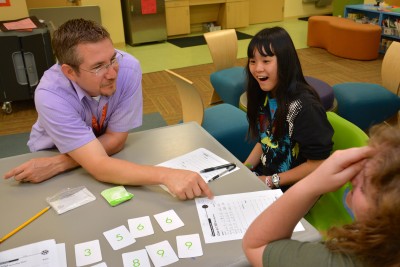Tim Jacobbe believes you’re a mathematician at heart—you just might not know it yet.
Forget the rote memorization of tedious formulas you may recall from your high school math classes. For Jacobbe, associate professor of mathematics and statistics education at the UF College of Education, math is far more than formulas: It’s a way of looking at the world
“I don’t think that people understand what math is,” Jacobbe says. “It’s about creating people that can solve problems in everyday life.”
And in a society increasingly driven by data, math is more important than ever, Jacobbe says. A solid understanding of statistics, which use a methodical process to analyze data, draw conclusions and interpret results, is particularly key to scrutinizing and solving real-world problems. Whether you’re deciding to change jobs, buy a house, or just making a pros and cons list, you’re using statistics—yet this discipline has long been overlooked in K-12 education.
Jacobbe is working to change that by training the next generation of teachers in statistics education. He once worked as a primary test developer for the advanced placement statistics program, but thought he could make a bigger impact in teacher education. At UF, he earned the college’s Undergraduate Teacher of the Year award in 2011, and he also leads a four-year, $2 million study funded by the National Science Foundation to develop better tests for assessing students’ statistical understanding.
His efforts to advance statistics education haven’t gone unnoticed by his peers. Jonathan Bostic, who earned a Ph.D. from UF in 2011 with Jacobbe as his co-adviser, says his former mentor is one of just a handful of experts widely recognized in the field. “There are very, very few folks like him in the United States,” says Bostic, now an assistant professor of mathematics education at Ohio’s Bowling Green State University.
Since 2009, Jacobbe has also devoted himself to helping teachers and students at UF’s P.K. Yonge Developmental Research School transition to the new, more stringent Florida Standards. This work at P.K. Yonge has a personal component for Jacobbe: His wife of 15 years, Elizabeth, teaches at the school, and his 10-year-old daughter, Hannah, and 7-year-old son, Nathan, are both students there.
“We need to teach math in different ways,” Jacobbe says. “Math is used as a gatekeeper to keep kids out of certain careers. Everyone is capable of doing mathematics, they just need the opportunity.”
Jacobbe’s desire to create opportunities for kids extends beyond math: It’s also a key element of the charity he founded in honor of his nephew, Caleb Jacobbe, who passed away from cancer in 2006 at the age of 8. Caleb’s Pitch aims to brighten the lives of seriously ill children and their families, bringing collegiate athletes into hospitals to visit with sick kids and organizing “syringe art” sessions, where children turn the medical implements into painting tools.
“Our mission is to help kids have fun while they’re going through that stuff,” Jacobbe says.
Whether honoring his nephew’s memory or giving teachers the tools necessary to help students excel, Jacobbe’s driving principle boils down to one simple formula: “I have a passion for helping people.”
Writer: Sarah L. Stewart (special to the College of Education)
